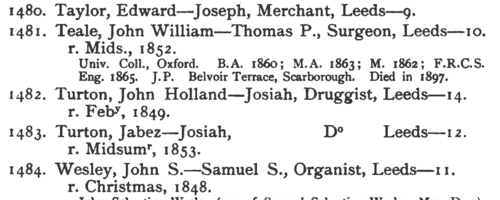Add this eBook to your basket to receive access to all 3,208 records. Our indexes include entries for the spelling barker. In the period you have requested, we have the following 3,208 records (displaying 1,751 to 1,760): These sample scans are from the original record. You will get scans of the full pages or articles where the surname you searched for has been found. Your web browser may prevent the sample windows from opening; in this case please change your browser settings to allow pop-up windows from this site. Boys entering Leeds Grammar School
(1841)
The admission books for Leeds Grammar School from 1820 to 1900 were edited by Edmund Wilson and published in 1906. The series of registers is almost complete for the period, there being in addition admission registers for the Lower (or Commercial) Department from 1856 to 1865, and lists of boys in the school in 1856, and in the Commercial Department in 1861. The entries are arranged by date or term of admission: a sequential number is given first, then surname, christian name, and, after a dash, father's christian name, occupation, and address; another dash, and then the age of the boy at admission, and often his year of leaving (with the abbreviation r. for 'removed' or 'left'). r.* means left without notice; (o) or S. or Stranger or Foreigner indicates a boy not on the foundation. The editor was unable to divine the meaning of the abbreviation (Q) or the asterisks prefixed to most entries in 1856 to 1860, but dutifully copies them into the text. In smaller type he then proceeds, where possible, to add some information about the boy's subsequent career. | Sample scan, click to enlarge

| British diplomats abroad
(1841)
The Royal Kalendar lists her Majesty's ministers in Austria, Bavaria, Belgium, Brazil, Colombia, Denmark, France, the Germanic Confederation, Greece, Hanover, Mexico, Naples, Netherlands, Portugal, Prussia, Russia, Sardinia, Saxony, Spain, Sweden, Switzerland, Turkey, Tuscany, the United States of America, the United Provinces of the Rio de la Plata, Venezuela and Wurtemburg; and British consuls in Austria, Barbary, Belgium, the Brazils, Buenos Ayres, Central America, Chile, Denmark, Egypt, Ecuador, France, Frankfurt, New Granada, Greece, the Hanseatic Republic, Haiti, Mexico, Monte Video, the Netherlands, Palestine, Peru Bolivia, Poland, Portugal, Prussia, the Roman States, Russia, the Sandwich and Society Islands, Sardinia, Saxony, the Two Sicilies, Spain, Sweden and Norway, Syria, Turley, Tuscany, the United States of America and Venezuela. | Sample scan, click to enlarge

| British sea officers
(1841)
The Royal Kalendar lists the 177 flag officers of the Royal Navy; the 670 captains (including superannuated and retired) and 751 commanders. The captains and commanders are given in order of precedence, determined by the dates of their appointment. Then there is a list of the ships of the navy, annotated with the names of their captains, with a separate section for steam vessels; packet brigs at Falmouth; and mail steam vessels at Dover, Weymouth, Pembroke, Liverpool, Holyhead and Portpatrick. | Sample scan, click to enlarge

| Dissolutions of Partnerships
(1841)
Trade partnerships dissolved, or the removal of one partner from a partnership of several traders, in England and Wales
| Sample scan, click to enlarge

| Dividends of bankrupts' estates
(1841)
Dividends from moneys raised from bankrupts' estates in England and Wales | Sample scan, click to enlarge

| English civil servants
(1841)
The Royal Kalendar lists officers and officials of a number of government bodies in London: Privy Seal, the Secretary of State's Office (including the Home, Irish, Foreign and Colonial departments, and the Colonial Land and Emigration Board) , the Queen's Mint, the Board of Council for Trade and Foreign Plantations; the Board of Commissioners for the Affairs of India; the Office of her Majesty's Woods, Forests, Land Revenues, Works and Buildings (including some officials in Scotland and the provinces, and the rangers and keepers of the royal parks); the State Paper Office; the Signet Office; Alien Department; Registry of Colonial Slaves; Establishment of Queen's Messengers; the Treasury Office; Commissariat Department; Receipt of Exchequer; Office of Paymasters of Exchequer Bills; Stationery Office; General Register Office; Poor Law Commission; Commissioners of Slave Compensation; Reduction of the National Debt and Life Annuity Office; and the Exchequer Bill Loan Office for Public Works and Fisheries. | Sample scan, click to enlarge

| Householders of the parish of St Giles in the city of Oxford
(1841)
A parliamentary poll of the freemen and electors of the City of Oxford was taken 30 June 1841, the candidates being Donald Maclean (Mac), James Haughton Langston (Lan) and Neill Malcolm (Mal). The poll book records the names, addresses and occupations of the householders, district by district, as well as the names of the freemen of the city, and shows for whom they voted. | Sample scan, click to enlarge

| Insolvents
(1841)
Insolvency notices for England and Wales: insolvency often caused people to restart their lives elsewhere, so these are an important source for lost links | Sample scan, click to enlarge

| Insolvents
(1841)
Insolvency notices for England and Wales: insolvency often caused people to restart their lives elsewhere, so these are an important source for lost links | Sample scan, click to enlarge

| Irish academics
(1841)
The Royal Kalendar lists officials and professors of Trinity College, Dublin, and the Royal College of St Patrick at Maynooth. | Sample scan, click to enlarge

|
Research your ancestry, family history, genealogy and one-name study by direct access to original records and archives indexed by surname.
|











